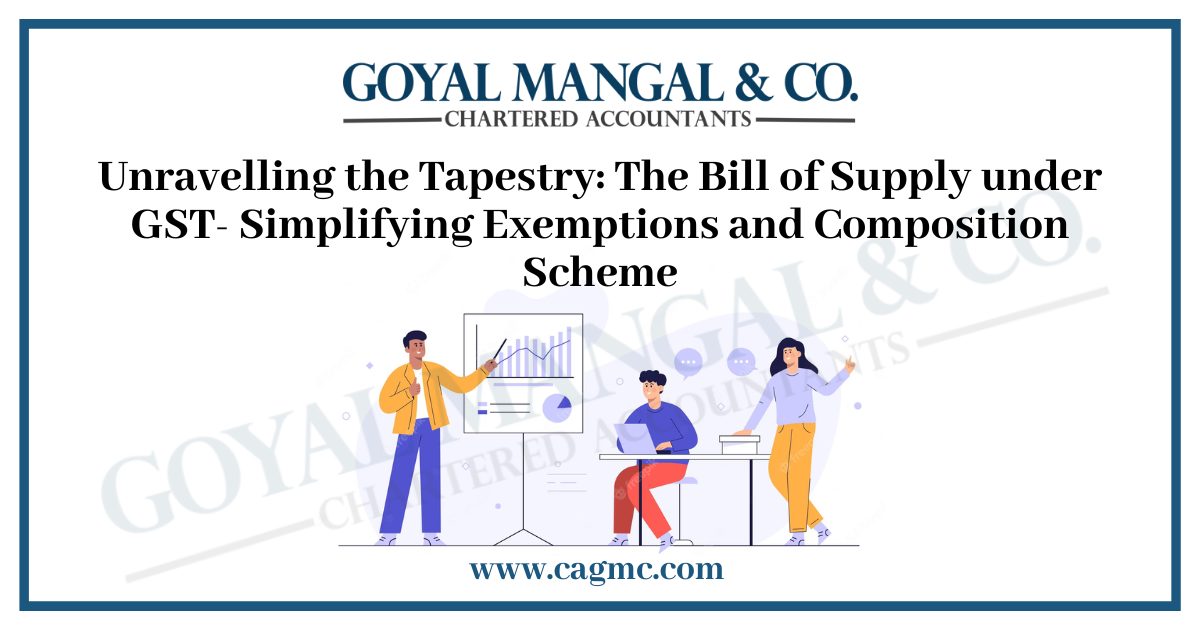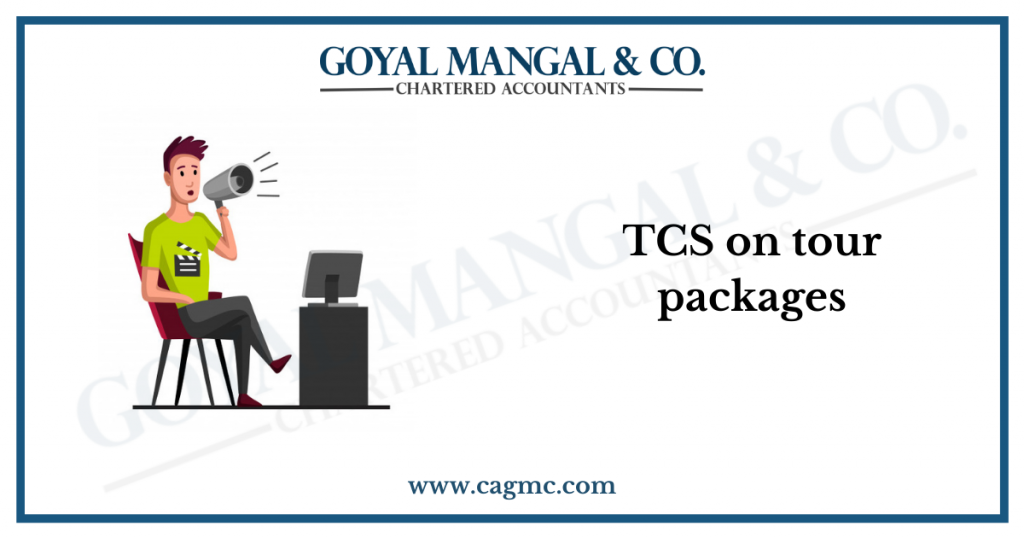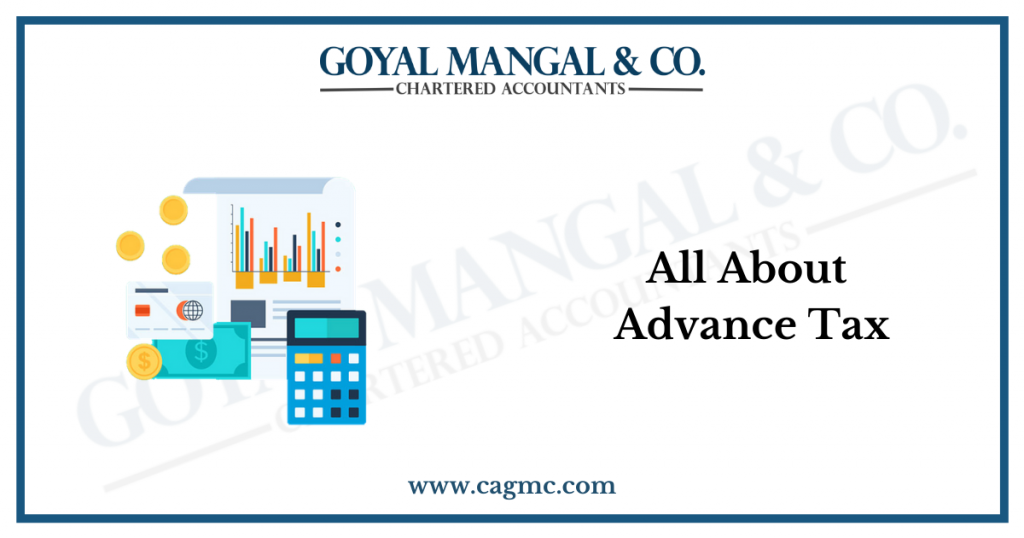
In the intricate web of tax regulations, one document stands apart as a beacon of simplicity and clarity. That is the Bill of Supply under the Goods and Services Tax (GST) system. While tax invoices take centre stage for taxable supplies, the bill of supply gracefully navigates the realm of exemptions and the composition scheme. In this article, we explore an enlightening journey to demystify the significance of the bill of supply.
|
Table of Content |
Glimpses of Bill of Supply under GST
In accordance with section 31(3) of the Central Goods and Services Tax Act, 2017 (CGST Act, 2017) is a document issued by a registered supplier when they make a sale of goods and services that are exempt from GST. Or when they are registered under a composition scheme. It is an alternative to a tax invoice. It is used in situations where GST is not applicable or where the supplier is not eligible to collect GST from the recipient. The key distinction between a tax invoice and a bill of supply lies in the taxability of the transaction.
Who is required to issue a Bill of Supply under GST?
The following entities are required to issue a Bill of Supply:
- Registered Taxpayers: Registered taxpayers who make supplies of goods or services that are exempt from GST or those who have opted for the Composition Scheme are required to issue a Bill of Supply. This includes businesses registered under GST who fall under the specified criteria for issuing the Bill of Supply.
- Exempt Supplies: A registered taxpayer who supplies goods or services that are exempt from GST is required to issue a Bill of Supply. Exempt supplies are those specifically listed under the GST law as not subject to GST.
- Composition Scheme Taxpayers: Suppliers who have opted for the Composition Scheme are also required to issue a Bill of Supply. The Composition Scheme is a simplified scheme available for small businesses with a turnover threshold. Under this scheme, suppliers pay tax at a fixed rate and are not eligible to collect GST from their customers. Therefore, they issue a Bill of Supply instead of a tax invoice.
- Recipients under the Reverse Charge Mechanism (RCM): In certain scenarios, the liability to pay GST shifts from the supplier to the recipient of goods or services under the reverse charge mechanism. In such cases, the recipient is required to issue a Bill of Supply to indicate their liability to pay GST.
Details required in Bill of Supply under GST
The Bill of Supply must contain specific details to comply with the GST regulations, which are provided under section 31(2)(c) of the CGST Act, 2017. Here are the essential details required:
- Name, Address, and GSTIN
- Bill of Supply Serial Number
- Date of Issue
- Name, Address, and GSTIN of the Recipient: If the recipient of the goods or services is a registered taxpayer, their name, address, and GSTIN should be provided in the Bill of Supply.
- Description of Goods or Services
- HSN or SAC Code: The Harmonized System of Nomenclature (HSN) code for goods or the Service Accounting Code (SAC) for services should be mentioned. These codes categorize goods and services for proper tax classification.
- Quantity and Unit of Measure: The quantity of the goods or services supplied, along with the appropriate unit of measure, should be specified.
- Value of Goods or Services: The total value of the goods or services supplied should be mentioned. This value should be exclusive of taxes.
- Any Other Particulars: Additional information or particulars required under the GST laws or regulations should be included in the Bill of Supply, if applicable.
Benefits of Bill of Supply under GST
This system offers several benefits for businesses operating in India. Here are some key advantages of the Bill of Supply:
- Compliance with Exempt Supplies: The Bill of Supply allows businesses to comply with the GST regulations when making supplies that are exempt from GST. It ensures proper documentation of these transactions, providing transparency and accountability.
- Simplification for Composition Scheme: For businesses registered under the Composition Scheme, the Bill of Supply simplifies the invoicing process. It enables them to accurately record and report supplies made under this scheme, which involves paying tax at a fixed rate.
- Clarity on Tax Exemption: By using the Bill of Supply, businesses can indicate that the supplies made are exempt from GST. This avoids confusion and ensures that the recipient understands that no GST applies to the transaction.
- Streamlined Documentation: The Bill of Supply provides a structured format for recording transactions involving exempt supplies or supplies made under the Composition Scheme. It ensures that all necessary details, such as supplier and recipient information, description of goods or services, and value, are appropriately captured.
- Input Tax Credit (ITC) Management: The Bill of Supply helps businesses manage Input Tax Credit (ITC) effectively. As exempt supplies or supplies under the Composition Scheme do not attract GST, the recipient cannot claim ITC. The Bill of Supply indicates that no tax has been charged, eliminating any confusion regarding ITC availability.
- Compliance and Audit Readiness: By using the Bill of Supply accurately and consistently, businesses can maintain proper records and demonstrate compliance during GST audits. It helps in establishing transparency and credibility with tax authorities.
- Integration with Accounting Systems: The Bill of Supply can be easily integrated into accounting systems for seamless invoicing and record-keeping. This ensures efficient management of financial transactions and simplifies the reconciliation process.
Takeaway
Through this article, we can conclude that the bill of supply regime served as a vital instrument for registered suppliers. During the time dealing with exempt supplies and the composition scheme. Whether it’s navigating exempt supplies or participating in the Composition Scheme, the Bill of Supply offers a straightforward alternative to tax invoices. It streamlines the documentation process, eliminates confusion around tax amounts, and supports efficient compliance with the GST framework. In the journey of GST compliance, the Bill of Supply acts as a reliable companion, enabling businesses to navigate exemptions and the Composition Scheme with confidence and ease.


